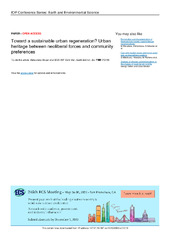Приказ основних података о документу
Toward a sustainable urban regeneration? Urban heritage between neoliberal forces and community preferences
| dc.creator | Stupar, Aleksandra | |
| dc.creator | Mihajlov, Vladimir | |
| dc.creator | Simic, Ivan | |
| dc.creator | Grujicic, Aleksandar | |
| dc.creator | Cvetkovic, Marija | |
| dc.date.accessioned | 2023-10-18T12:03:33Z | |
| dc.date.available | 2023-10-18T12:03:33Z | |
| dc.date.issued | 2023 | |
| dc.identifier.uri | https://raf.arh.bg.ac.rs/handle/123456789/1337 | |
| dc.description.abstract | The paper discusses a relationship between the neoliberal forces shaping contemporary urban transformations and the social sustainability of recent regeneration projects focused on urban heritage. Analysing two post-transitional cases, based on two different approaches, the paper will provide an insight into the dominant processes influencing both practices, as well as their anticipated/announced social sustainability and its achieved level.The first case is from Serbia - the Power Plant "Power and Light‖ - which was the first one generating alternating current in Belgrade. Located in the Dorcol area, this ex-industrial setting is situated close to the city center. Since 2005, the entire area has undergone a significant transformation into a luxurious residential and commercial complex, initiated by private investors and directed by city authorities in order to change the previous urban image.The second case, the Contemporary Art Center in Plovdiv, Bulgaria, represents different approach. Created in 1997, the center is a non-governmental organisation of public interest. In 1995 the Municipality of Plovdiv obtained the right to locate the center within the remains of the ancient baths of Rome, which were rebuilt under the Turkish Empire. As the 16th century monument, the building belonged to the municipality and in 2004, the three-year period of support started, provided by the association Art Today (the Swiss cultural program), as well as the National Heritage Fund in Bulgaria.The analysis will be based on the selected principles of social sustainability, simultaneously highlighting the problems of heritage (re)use and regeneration in a challenging global environment of uncertain financial flows and shifting local governmental priorities, which could put on hold or totally ignore the aspect of social sustainability. | sr |
| dc.language.iso | en | sr |
| dc.publisher | IOP Publishing | sr |
| dc.rights | openAccess | sr |
| dc.rights.uri | https://creativecommons.org/licenses/by/4.0/ | |
| dc.source | IOP Conference Series: Earth and Environmental Science, Volume 1196, SBE23-Thessaloniki "Sustainable built environments: Paving the way for achieving the targets of 2030 and beyond" 22/03/2023 - 24/03/2023 Online | sr |
| dc.subject | urban regeneration | sr |
| dc.subject | industrial heritage | sr |
| dc.subject | social sustainability | sr |
| dc.subject | neoliberal urban transformations | sr |
| dc.subject | post-socialist transition | sr |
| dc.title | Toward a sustainable urban regeneration? Urban heritage between neoliberal forces and community preferences | sr |
| dc.type | conferenceObject | sr |
| dc.rights.license | BY | sr |
| dcterms.abstract | Симиц, Иван; Михајлов, Владимир; Ступар, Aлександра; Грујициц, Aлександар; Цветковиц, Марија; | |
| dc.citation.volume | 1196 | |
| dc.identifier.doi | 10.1088/1755-1315/1196/1/012106 | |
| dc.identifier.fulltext | http://raf.arh.bg.ac.rs/bitstream/id/4606/Stupar_2023_IOP_Conf._Ser.__Earth_Environ._Sci._1196_012106.pdf | |
| dc.type.version | publishedVersion | sr |

